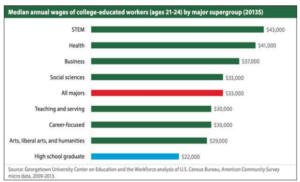Considerations are Many when Choosing a Major
This is the time of the year when high school seniors start planning to apply for college and among the myriad decisions they face is what major they will choose. Many will at least temporarily avoid the decision by declaring themselves “undecided.”
The choice of a major is very complex and can even be influenced by their first year of college. Students might discover new possibilities thanks to an inspiring professor, or decide that their original plan was really not for them. In fact, we see a lot of the latter among students wanting to become medical doctors, dentists, or get in other health-related fields.
Now a new report sheds some light on what could be the benefits of choosing the “right” major, at least from a financial viewpoint. The report, titled “The Economic Value of College Majors,” just published by the Georgetown University Center on Education and the Workforce, includes really interesting data.
For example, college graduates employed full time on a 12-month contract and with a bachelor’s degree earn an average annual salary of $61,000 over the course of their careers, while those with a graduate degree earn on average $78,000 annually. Once again we have confirmation that a college degree is a pathway to better living standards, given that according to the U.S. Census Bureau the average household income is about $50,000, and that includes all people including those with a college degree.
At the top of the highest-earning majors are those in architecture and engineering. Education majors are paid the least. This fact is interesting given that, according to the U.S. Department of Education, there is a shortage of teachers in this country. College graduates who majored in architecture or engineering earn an average salary of $83,000 per year, while education majors earn $45,000 per year. Further, petroleum engineering majors are paid the most ($136,000 over the course of their careers) while early childhood education majors are paid the least ($39,000 annually). These data help to explain why education schools at colleges and universities are struggling with low enrollments.
But we should be careful about averages. For example, business majors’ wages vary the most from $43,000 annually at the 25th percentile to $98,000 annually at the 75th percentile, a difference of $55,000.
On the other hand, despite the chances for higher earning for engineers, it is not the most popular major in the U.S. The most popular major right now is business, which has been the case for the last 20 years or so. In fact, business majors account for 26 percent of college-educated workers. Agricultural and natural resources majors are the least common, accounting for less than 2 percent of college-educated workers. Among business majors the most popular specializations are business management and administration, representing 8 percent of college-educated workers.
One of the big buzzwords we are hearing in higher education these days is STEM (Science, Technology, Engineering and Math) careers. This is particularly true in public higher education where many politicians are holding the belief that those are the only careers worthy of pursuit. Majors in these areas comprise 20 percent of college-educated workers. but that figure can be a little misleading given that the distribution per specialty is very unbalanced. For example, 8.3 percent are in engineering while 5.6 are in statistics and mathematics. Biology and life sciences and physical sciences are only 3.4 and 2.5 percent respectively.
Also, we must take into consideration that many people who obtain a bachelor’s degree move on into graduate schools. There we find big differences when it comes to preferences regarding areas of specialization. For example, graduates in biology and life sciences are most likely to earn a graduate degree (58 percent), while communications and journalism majors are the least likely to earn a graduate degree (21 percent). The former, which includes health and medical preparatory programs majors, are the most likely to lead to a graduate degree, at 75 percent compared to 35 percent of all college graduates.
An important question that is oftentimes missing in discussions about choice of major is if potential financial earnings should dictate what college path students should pursue? Certainly not. To begin with, not all people have the same aptitudes. Some people may be very good at math (something that you need for engineering), while others are not. Some people will find more inclination to areas where creativity is highly prized, such as the arts. While still others will find a more welcoming home in careers where expectations are less flexible.
Another consideration has to do with the cost of earning different degrees. Many universities have differential tuition, pricing classes for technical majors, such as engineering, at higher rates for tuition and fees than for other majors.
Family is also a factor. Many people choose to stay in the same area where they have relatives for a multitude of reasons, and local institutions of higher education may not offer all educational opportunities.
At the end of the day we must consider that financial gain is not everything. When we choose a career path, that is a decision that will influence who we are going to be for the rest of our lives. We must make sure that whatever we want to do is going to make us happy. Choosing a major must be a decision that takes into consideration a multitude of factors that go well beyond financial gains.
PDF Version
Considerations Are Many When Choosing A Major
